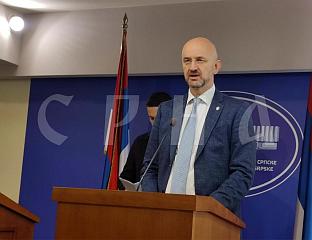English
12.11.2025

THE DAYTON AGREEMENT HAS SHOWN THAT WESTERN POWERS SIGN AGREEMENTS THAT THEY DO NOT RESPECT

BELGRADE, NOVEMBER 12 /SRNA/ - Academician Slavenko Terzić told SRNA that the Dayton Agreement, signed 30 years ago, partially recognized the results of the Serb people’s struggle for identity and independence in BiH, but also revealed what has since become common practice in international relations - that Western powers sign agreements knowing in advance they will not respect them.
Terzić assessed that, in the current situation, it is entirely reasonable for the leadership of Republika Srpska to insist on respect for the Dayton Agreement, as this document largely guarantees at least the basic achievements of the Serb people’s political struggle in BiH. He pointed out that there is a clear tendency on the part of the Muslim leadership in Sarajevo, supported by certain Western powers, to gradually continue stripping Republika Srpska of its rights, thereby creating conditions for the establishment of a unitary BiH which would, in effect, mean nullifying the Serb people’s struggle for independence. "On the other hand, I see a gradual process of restoring some elements of balance in international relations, to which the policies of China and the Russian Federation certainly contribute. However, I believe we are still far from a situation in which internationally signed agreements and international law are respected," Terzić said. He points out that there are some indications the United States might give up its all-pervasive interventionism around the world and its practice of imposing order through sheer military force, but that it is difficult at this moment to predict in which direction that process will go. According to him, it is evident that there is an internal political crisis in the U.S, so the question is whether President Donald Trump and his team will have the strength to reverse the current trends and move toward restoring stability in international relations and respect for international law. "So, when it comes to the fate of Republika Srpska, one might notice a certain process emerging that could guarantee its stability and the rights granted to it under the Dayton Agreement, but I believe that, in the long term, it is difficult to predict the direction in which events will unfold," said Terzić. Regarding the Dayton Agreement, Terzić says that the agreement partially recognized the results of the Serb people’s struggle for their identity and independence in BiH, but also demonstrated that Western powers sign treaties with ill intent and a pre-formulated aim of not honoring them. He stated that this has become a common practice throughout the 20th and early 21st centuries in international relations, especially when it comes to Western powers, noting that there are numerous examples of this, from the Dayton Agreement, through UN Security Council Resolution 1244 and the so-called Kumanovo Agreement, to the Minsk Agreements and many other treaties. "The Dayton Agreement is therefore important for Republika Srpska, as it recognizes it as an equal entity within BiH. However, the problem lies in the fact that, over time, the powers originally granted to Republika Srpska under the Dayton Agreement, which ensured a high level of autonomy, have been gradually taken away," said Terzić. Terzić pointed out that the obstruction of the Dayton Agreement’s implementation began the moment the so-called high representatives of the international community started enforcing not the provisions of the Agreement, but rather the will of the leading Western powers. The General Framework Agreement for Peace in BiH, better known as the Dayton Peace Agreement, was negotiated on November 21, 1995, at the Wright-Patterson Air Force Base near Dayton, Ohio, and was formally signed on December 14 of the same year in Paris. The Dayton Agreement defined BiH as a state composed of two entities and three constituent peoples, and its Annex 4 established the constitutional structure of BiH and the division of competences between the state level, Republika Srpska, and the Federation of BiH. In the years following the signing of the Dayton Agreement, under pressure from the OHR /Office of the High Representative/ and the Constitutional Court of BiH, more than 80 competences were taken away from Republika Srpska and transferred to the level of BiH.
English


MAN FROM GRAČANICA THREATENED JEWS IN SARAJEVO
SARAJEVO, NOVEMBER 12 /SRNA/ – Sarajevo Canton police have identified a 46-year-old man from Gračanica, with the initials Z.Đ., who issued threats on...


MAZALICA: FOREIGN JUDGES AND CHRISTIAN SCHMIDT SHOULD LEAVE BiH
BANJA LUKA, NOVEMBER 12 /SRNA/ - The Head of the SNSD Caucus in the Republika Srpska National Assembly Srđan Mazalica stated that the foreign judges s...


CONSTITUTIONAL COURT OF BiH SHOULD ASSESS DECISION ON APPOINTING NEGOTIATOR WITH THE EU
BANJA LUKA, NOVEMBER 12 /SRNA/ - The SNSD Caucus in the Republika Srpska National Assembly today submitted a request to the Constitutional Court of Bi...


ROSTEC'S WREATH LAID AT BUST OF LEGENDARY GENERAL ZHUKOV
BANJA LUKA, NOVEMBER 12 /SRNA/ - Many people from Banja Luka and other visitors these days stopped by the bust of the legendary Russian and Soviet mil...


KOŠARAC: WE ARE FED UP WITH SARAJEVO’S HYPOCRISY AND DOUBLE STANDARDS!
ISTOČNO SARAJEVO, NOVEMBER 12 /SRNA/ - The new procedure initiated by the Central Election Commission /CEC/ of BiH against SNSD President Milorad Dodi...


DODIK: BY ELECTING SINIŠA KARAN, SRPSKA IS CHOOSING PATH OF PROGRESS AND DEVELOPMENT
BRČKO, NOVEMBER 11 /SRNA/ – SNSD Leader, Milorad Dodik, says at a rally in Brčko that by electing Siniša Karan as president, Republika Srpska is choos...





 LATEST NEWS:
LATEST NEWS: